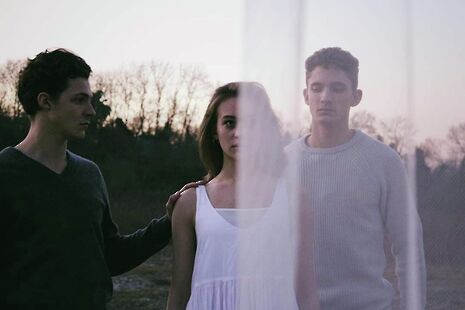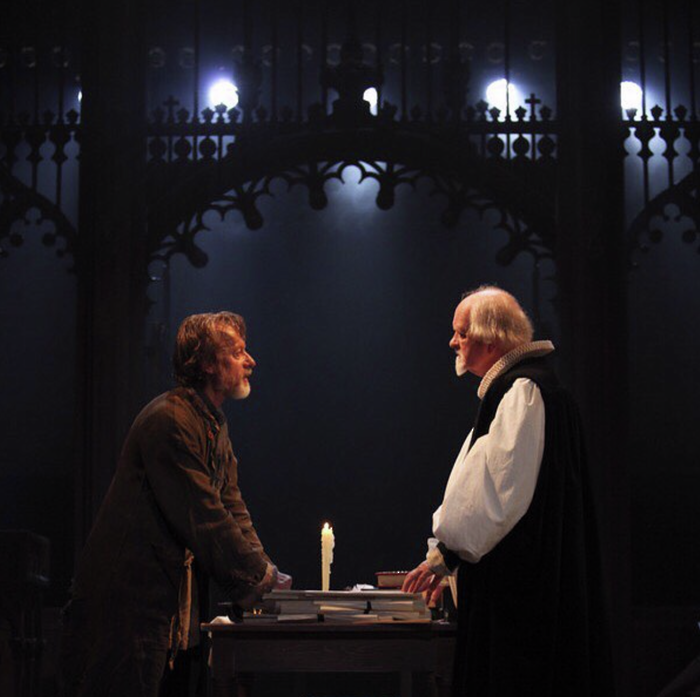Yerma preview
Madeleine Trépanier attends rehearsal for a Corpus Playroom production that is a brutal and physical approach to the “pressures a society can assert on a woman”

The premise of Federico García Lorca’s Yerma is a simple one: a married, but childless, woman longs to be a mother and is driven to madness. The reality of the text is more nuanced. Poised at the centre of Lorca’s ‘Rural Trilogy’, a trio of plays depicting the brutality of contemporary life in pre-Civil War Spain, Yerma is reminiscent of Blood Wedding in its lyricism and anticipates the psychological depth of The House of Bernarda Alba. Like both plays, it’s a piece of theatre concerned with the pressures a society like that in which Lorca lived can exert on the individual, and in particular, can exert on a woman. Yerma’s own name translates as ‘barren’; her failure to fulfil her socially ordained role as a mother subsumes her identity.
Annabelle Haworth, playing the title role, explains that she finds the intimacy of the Corpus Playroom ideal for this kind of role: ‘Having that gaze all around you, all the time… it creates the right kind of pressure.’ To her Yerma is ‘a victim of the society she’s living in’, yet at the same time, she’s so much more than an archetype. ‘She’s impossible to pin down,’ Haworth continues, and director Amara Heyland-Morrin agrees, adding, ‘There’s so much breadth with Yerma… she’s so vulnerable, she’s passionate, she’s kind of caught between so many things, between being childlike and being so wise.’
"Lorca is visceral and embodied"
While directing a rehearsal of the show’s climactic final scene, Heyland-Morrin mentions Ruth Wilson’s celebrated performance as Hedda Gabler and Haworth nods; this is clearly a performance they’ve discussed before. With an ADC production of Hedda Gabler having just closed, I wonder if the cast and crew of Yerma feel any extra pressure to differentiate between the narratives of these two trapped and destructive women. But as Heyland-Morrin explains, while there are undoubtedly similarities between the plays, it comes down to a difference in the playwrights. ‘Ibsen is so intellectual,’ she says, ‘and the difference is experiential; Lorca is visceral and embodied. There’s a different sense of rawness.’
Heyland-Morrin’s production is designed around that sense of rawness. Physical theatre set pieces have been devised with the cast, often accompanied by live original music, composed by Sam Tannenbaum. The design is minimalistic, with some basic indications of the domestic, but this serves to accentuate the timelessness of Yerma’s story. While some productions choose to lean into the 1930’s setting, others adapt the material to make it explicitly modern, such as the recent revival starring Billie Piper, which inverted the text’s focus, turning a small rural community with eyes everywhere into an intrusive Internet culture. This production isn’t really ‘set’ anywhere and instead flows from devised physical theatre to projections to original music, in keeping with Lorca’s own interpretation of the text as a ‘tragic poem’, rather than a straight piece of theatre.
When I arrive, Haworth and Gabriel Wheble, in the role of Yerma’s husband Juan, are deep in rehearsal. The final scene, without giving anything away, is one which mingles sex and violence, intimacy and manipulation. Heyland-Morrin has opted for a highly physical approach, which appears to work well, lending the scene the factor of shock it deserves. Yerma and Juan’s marriage is on the brink of collapse, and the direction expertly utilises the Playroom’s size, making it feel somehow both confining and large enough to create an insurmountable distance between husband and wife. It strikes me as a scene crafted with just the right degree of stillness and tension, and if it’s any indication of what the rest of the play is like, promises a thoughtful new take on Lorca’s classic.
 Features / Should I stay or should I go? Cambridge students and alumni reflect on how their memories stay with them15 December 2025
Features / Should I stay or should I go? Cambridge students and alumni reflect on how their memories stay with them15 December 2025 News / Cambridge study finds students learn better with notes than AI13 December 2025
News / Cambridge study finds students learn better with notes than AI13 December 2025 News / Dons warn PM about Vet School closure16 December 2025
News / Dons warn PM about Vet School closure16 December 2025 News / News In Brief: Michaelmas marriages, monogamous mammals, and messaging manipulation15 December 2025
News / News In Brief: Michaelmas marriages, monogamous mammals, and messaging manipulation15 December 2025 Comment / The magic of an eight-week term15 December 2025
Comment / The magic of an eight-week term15 December 2025









